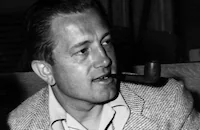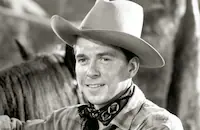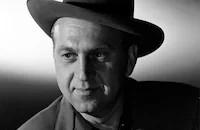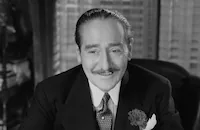Hollywood On Trial

Brief Synopsis
Cast & Crew
David Helpern
Albert Maltz
Senator Joseph R Mccarthy
John Huston
Ring Lardner Jr.
Zero Mostel
Film Details
Technical Specs
Synopsis
The effects of McCarthy era in the movie industry are examined in this documentary. Victims of the House UnAmerican Activities Committee and the blacklisting that ended so many careers are interviewed. But the primary focus of the fim is the "Hollywood Ten" a group of writers and directors who were imprisoned because they refused to answer the committee's questions and name names.
Director
David Helpern
Cast
Albert Maltz
Senator Joseph R Mccarthy

John Huston
Ring Lardner Jr.

Zero Mostel
Leo Townsend

Walt Disney
Lester Cole

Otto Preminger

Gale Sondergaard
Millard Lampell

Edward Dmytryk
William Wheeler
Ben Margolis

Ronald Reagan
Walter Bernstein
Louis B. Mayer

Robert Taylor

Jack Warner

Gary Cooper

Dalton Trumbo
Alvah Bessie

Howard Da Silva

Martin Ritt

Adolphe Menjou
Crew
Barry Abrams
Barry Abrams
Walter Bernstein
Alvah Bessie
Richard Bock
Donald Clark
Lester Cole
Gary Cooper
Howard Da Silva
Austin De Besche
Walt Disney
Edward Dmytryk
Stephen J Friedman
Frank Galvin
Frank Galvin
Bonnie Gangelhoff
Bonnie Gangelhoff
James C Gutman
Leilani Hayes
Juergen Hellwig
David Helpern
Ed Joyce
Max Kalmanowicz
Max Kalmanowicz
Mimi King
Millard Lampell
Ring Lardner Jr.
Joseph Losey
Vic Losick
Albert Maltz
Ben Margolis
Louis B. Mayer
Senator Joseph R Mccarthy
Adolphe Menjou
Irwin Meyer
Zero Mostel
Suzanne Pettit
Otto Preminger
Ronald Reagan
Arnie Reisman
Martin Ritt
John Rossi
Cabell Smith
Gale Sondergaard
Carol Stein
Carol Stein
Robert Taylor
Stephanie Tepper
James Townsend
Leo Townsend
Dalton Trumbo
Jack Warner
William Wheeler
Sue Wittenberg
John Zimmerman
Film Details
Technical Specs
Articles
Hollywood on Trial
Looked at from one angle, the detractors weren't entirely wrong, since many members of the industry did have left-wing sympathies that affected their work. Looked at from other angles, though, the case is shaky. Then as now, Hollywood was run by businessmen who cared more about making a buck than making a point, and they didn't want to fill theaters with pictures that would rub conservative moviegoers the wrong way. That argument is woven into David Helpern Jr.'s documentary Hollywood on Trial, released in 1976. Its subject is the Red Scare, its effects on the motion-picture industry, and the punishment it inflicted on conscientious writers, directors, and performers who were blacklisted from employment when they refused to cooperate with federal investigations that they saw as unconstitutional invasions of their privacy and intrusions on their political beliefs.
Although the dominant anti-communist warrior of this period was Joseph McCarthy, a senator from Wisconsin who saw subversives almost everywhere he looked, he didn't take office until 1947 and played no part in the widely publicized hearings by the House Un-American Activities Committee that also started in 1947. Hollywood on Trial gives a sample of his rhetoric in archival footage, but traces the attacks on the entertainment industry to the years before World War II, when the conservative Democratic Congressman Martin Dies led HUAC in efforts to curtail the Federal Theater Project - a Depression-era enterprise giving employment to stage artists - by accusing participants of expressing left-wing views. Other developments paving the way for anti-communist extremism included the labor struggles of the 1930s, some of them violent, and the support of many Americans for the anti-fascists fighting the Spanish Civil War from 1936 to 1939. These and other factors led to postwar friction between Americans happy with the status quo and others convinced that sociopolitical change was urgently needed.
There were two sets of HUAC hearings on Hollywood's alleged communist leanings. The first commenced in 1947, officiated by committee chair J. Parnell Thomas, and the second, chaired by John S. Wood, began in 1951. The most widely known catchphrase of the investigations was a question - "Are you now, or have you ever been, a member of the Communist Party?" - repeatedly posed by Thomas during the first round of sessions. The committee's search for answers was complicated by its insistence that witnesses with communist associations not only implicate themselves but also state the names of others involved. This was naturally anathema for anyone unwilling to become an informer. As one figure in Hollywood on Trial remarks, it could be called "government by stool pigeon."
Critics of HUAC have long contended that its focus on Hollywood was motivated less by concern over left-wing propaganda than by hunger for the publicity that would accrue when iconic movie actors and other studio celebrities were hauled in for questioning with cameras and microphones capturing the proceedings for all the world to see. Some of the people summoned were so-called friendly witnesses - stars Gary Cooper and Robert Taylor were among them - who obliged the committee by condemning communist influences and in some cases denouncing colleagues.
Also in the mix were 19 "unfriendly witnesses" who refused to testify about their political beliefs or connections; some also lashed out at the committee with countercharges of un-American activity. The most notorious outcome of the 1947 hearings was the prosecution of the Hollywood Ten, uncooperative witnesses who were held in contempt of Congress for their refusal to testify as requested. They expected the US Supreme Court to overturn their convictions, but two justices died and were replaced by more conservative judges, tilting the court to the right. The ten convictions were upheld and prison terms followed.
One victim was the acclaimed screenwriter Ring Lardner Jr., who told the committee, "I could answer the question exactly the way you want, but...I would hate myself in the morning." Another was Dalton Trumbo, an Academy Award nominee for the screenplay of Sam Wood's 1940 drama Kitty Foyle, which was also nominated for Best Picture and won Ginger Rogers the Oscar for Best Actress. Trumbo spent eleven months in a federal prison, and finding himself on a secretive but strict Hollywood blacklist afterward, continued to write under a pseudonym or under the name of a front. When his original story for Irving Rapper's The Brave One (1956) won an Oscar, credited writer Robert Rich wasn't present at the ceremony, for the excellent reason that no such person existed. Others on the blacklist went on to work in other countries, doing different types of writing, or to leave the entertainment field altogether. The blacklist was finally broken when Stanley Kubrick and Otto Preminger openly named Trumbo as the writer of their epic films Spartacus (1960) and Exodus (1960), respectively.
These and are other events of the Hollywood Red Scare are set forth clearly and dramatically in Hollywood on Trial, which includes a great deal of archival footage, interviews with blacklist victims conducted for the documentary, and a narration written by Arnie Reisman and read by John Huston in his uniquely mellifluous tones. Clips from Hollywood movies punctuate the film, including pro-Soviet pictures like Michael Curtiz's Mission to Moscow (1943) and Gregory Ratoff's Song of Russia (1944), made when the US and the USSR were wartime allies. And stargazers will spot a parade of Hollywood icons, from Humphrey Bogart, Lauren Bacall, and Zero Mostel to Gale Sondergaard, Walt Disney, and Ronald Reagan, taking various sides on the issues being discussed, debated, and fought over as hard-won reputations, celebrated careers, and even human lives stand in the balance. No single documentary could etch a complete portrait of the Red Scare and its consequences, but Hollywood on Trial gives a riveting and revealing account of a historical episode that must be remembered and learned from if it is not to happen again.
Director: David Helpern Jr.
Producer: James Gutman
Screenplay: Arnie Reisman
Cinematographer: Barry Abrams
Film Editing: Frank Galvin
With: John Huston (Narrator), Walter Bernstein, Alvah Bessie, Lester Cole, Howard Da Silva, Edward Dmytryk, Millard Lampell, Ring Lardner Jr., Albert Maltz, Ben Margolis, Zero Mostel, Otto Preminger, Ronald Reagan, Martin Ritt, Gale Sondergaard, Leo Townsend, Dalton Trumbo (themselves)
BW/Color-105m.
by David Sterritt

Hollywood on Trial
Ronald Reagan, 1911-2004 - TCM Remembers Ronald Reagan
Ronald Reagan, the actor turned elected official whose fascinating career saw him develop as a contract player for Warner Brothers studios, to a politician who fulfilled his ambitions by becoming the 40th President of the United States, died at his home in Los Angeles on June 5 after a long battle with Alzheimer's disease. He was 93.
He was born Ronald Wilson Reagan on February 6, 1911 in Tampico, Illinois to John and Nelle Reagan. When Reagan was nine, his family settled down in the small community of Dixon, about 100 miles west of Chicago. After high school, Reagan enrolled in Eureka College, a small Christian school near Peoria. He graduated in 1932 with a degree in Economics, and pursued a career in broadcasting. His first gig was as a part-time announcer at WOC in Davenport, Iowa. Within a year, WOC had merged with its big-sister station, WHO in Des Moines, and Reagan was hired as a sports announcer.
In the spring of 1937, Reagan drove to Southern California to catch the Chicago Cubs in spring training on Santa Catalina Island. While he was in California, he wrangled a screen test and signed a contract for $200 a week with Warner Brothers. His film debut was rather inauspicious; he portrayed a radio announcer in an innocuous comedy Love is on the Air (1937). He made a few more "B" programmers like Hollywood Hotel (also 1937), and Girls on Probation (1938), before getting his first prominent role opposite Bette Davis in the popular tearjerker, Dark Victory (1939).
Although he seldom got credit for being a good actor, there was no denying that Reagan held his own given the right material: Knute Rockne, All American as the doomed Notre Dame football hero George "The Gipper" Gipp, where he delivered the film's immortal line "Win one for the Gipper!"; Santa Fe Trail in which he ably supports Errol Flynn in one of the boxoffice hits of its era (both 1940); Kings Row (1941), featuring one of his finest performances as a small-town playboy whose legs are amputated by a careless surgeon; and Desperate Journey (1942) where he again supported Flynn in an exciting action picture.
Due to his poor eyesight, Reagan didn't see any action in World War II, so the studio heads assigned him to star in a series of patriotic films produced by the First Motion Picture Unit of the Army Air Forces in Culver City. Between 1942-45, Reagan starred in over 400 of these films. After the war, Reagan still found some good roles: The Voice of the Turtle (1947) proved he had a deft hand at light comedy opposite Eleanor Parker; The Hasty Heart (1949) offered another underrated performance as he ably portrayed the Yank in John Patrick's much heralded wartime play; and Storm Warning (1950) was a slick melodrama that cast Reagan as a crusading District Attorney determined to bring the KKK in a small southern town, with the help of Doris Day and Ginger Rogers!
It was around this time that Reagan became involved in politics. In 1947, he began a five-year term as president of the Screen Actors Guild (SAG), and testified in October of that year before the newly formed House Un-American Activities Committee (HUAC). He identified suspected Communists Larry Parks, Howard Da Silva and Alexander Knox, all of whom were subsequently called to testify, and subsequently blacklisted. Later records showed Reagan was so concerned about the Communist influence in Hollywood, that he became an FBI informer.
As Reagan became steeped in his political career, his parts throughout the '50s became inferior: the notorious Bedtime for Bonzo (1951); the coy "sex" comedy She's Working Her Way Through College (1952) that cast him as a college professor who romances a stripper! (Virginia Mayo); Cattle Queen of Montana (1955), a sluggish Western that even the redoubtable Barbara Stanwyck couldn't save; and finally Hellcats of the Navy (1957), a stodgy war picture that would be his only film that co-starred his wife Nancy (Davis).
Television offered some salvation. For eight years, (1954-62), Reagan served as the host of General Electric Theater, a televised series of dramas. He also found a niche as GE's goodwill ambassador to employees and to civic and business groups around the country, furthering his taste and honing his craft as a public official. By the mid '60s, Reagan would move into politics entirely, save for one last film, the thrilling The Killers (1964), Reagan's only known villainous role, as a murderous gangster. That same year, he actively campaigned for Republican Presidential candidate Barry Goldwater, although Goldwater lost to Lyndon B. Johnson.
Reagan whose profile was riding high, had cemented his future as a successful politician. In 1966, he ran against incumbent Governor Pat Brown for the state of California and won, serving successfully for two terms until 1974.
Reagan began an all-out, two-year drive to wrest the 1976 nomination from incumbent Gerald R. Ford, an appointed vice president who became president on the resignation of Nixon. Reagan fell short by a handful of delegates to the Republican national convention. But Ford lost to Jimmy Carter, and Reagan became the front-runner to challenge Carter in 1980. After defeating Carter, Reagan held two terms as President of the United States (1981-89). After his second term was over, he retired quietly in California. In 1994, it was revealed to the media that Reagan was suffering from Alzheimer's disease; he had been kept out of the public eye since then.
He was married briefly to actress Jane Wyman (1940-48), and had two children; a daughter Maureen and an adopted son, Michael. In 1952, he married a budding film starlet, Nancy Davis, who bore him two more children; a daughter, Patty; and a son, Ronald Jr. Ronald Reagan is survived by Nancy, Michael, Patty and Ron Jr. His daughter Maureen died of Melanoma in 2001 at the age of 60.
by Michael T. Toole
Ronald Reagan, 1911-2004 - TCM Remembers Ronald Reagan
Quotes
Trivia
Miscellaneous Notes
Released in United States 1976
Released in United States June 1998
Released in United States on Video April 12, 1989
Shown at Nantucket Film Festival (Ring Lardner, Jr series) in Nantucket Island, Massachusetts June 16-21, 1998.
Released in United States 1976
Released in United States on Video April 12, 1989
Released in United States June 1998 (Shown at Nantucket Film Festival (Ring Lardner, Jr series) in Nantucket Island, Massachusetts June 16-21, 1998.)













